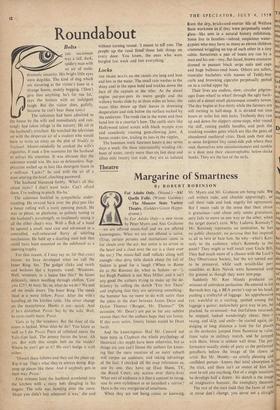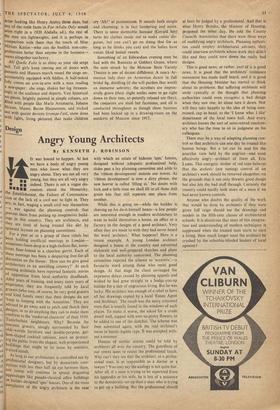Theatre
Margarine of Smartness
By ROBERT ROBINSON For Adults Only. (Strand.)—Alt! Quelle Folic (Winter Garden.) —The Moscow State Variety Theatre. (Golders Green Hippo- drome.) IN For Adults Only—a new revue by Peter Myers and Alec Grahame —we are offered music-hall and we arc offered knowingness. What we are not offered is satire. (True, certain persons and institutions' come in for clouts over the edr, but satire is an arrow in the heart and a clout over the ear is a clout over the ear.) The Music-hall stuff rollicks along well enough--that dirty little sketch about the fall of Sodom is good for a laugh ('When in Rome do as ,the Romans do, when in Sodom--er—'), but Hugh Paddick is not Max Miller, and it isn't any good the authors trying to make up the de- ficiency by calling the sketch You Are There' and implying that they are satirising something : the humour has no more to do with satire than the jokes in the duet between James Dean and Dylan Thomas ('Bangor, Mr. Thomas?' On occasion, Mr. Dean') are put in for any subtler reason than that the authors hope they are funny. If this were satire, Jimmy James would be Dean Swift.
And the knowingness. Had Mr. Coward not been born in Clapham the whole psychology of theatrical chic might have been otherwise, but as things are you can't blame the authors for know- ing -that the mere mention of an outer suburb will corpse an audience, and taking advantage of the fact. I checked off the map. references as, one by one, they hove up (East Sheen, TV, the Royal Court, any actress over thirty-five). What sort of audience is it that is content to recog- nise its own stylishness in so tarnished a mirrOr? Here is the very margarine of smartness.
When they are not being comic or knowing, Mr. Myers and Mr. Grahame are being rude. We call writers rude,' and chuckle approvingly, or .call them rude and look angrily for agreement. But I mean rude in the sense that their abuse is gratuitous—and abuse only seems gratuitous, only fails to move us one way or the other, when the target doesn't exist. Why Ludovic Kennedy'? Mr. Kennedy represents no institution, he has no public character, no persona that has inspired us all to love or hate him. So why—what's Ken- nedy to the audience, what's Kennedy to the point? They Might as well insult your Uncle Bill. They had much more of a chance with the Lord's Day Observance Society, but the wit turned out to be primeval, while such wraith-like per- sonalities as Kim Novak were hammered into the ground as though they were tent-pegs.
Suddenly Mr. Ron Moody produced six minutes of unbroken perfection. He entered in his Barrault-boy rig, a BEA porter's cap on his head, pushing a trolleyful of luggage : his apprehensive eye, watchful as a starling, spotted among the luggage a guitar; melancholy gave way to joy, he plucked, he strummed—but fearfulness returned, he stopped, looked wanderingly about; then- twang, and skip, and smile—he started again, in- dulging at long distance, a taste for far places as the orchestra jumped from flamenco to valse, from valse to military march, and he jumped with them. Mime is seldom well done. The per- formance usually stinks of piety as the performer genuflects before the image of the clown as artist. But Mr. Moody—an utterly pleasing and confident person—knows that total absorption is the trick, and there isn't an ounce of him left over to sell you anything. Out of a single intuition, he develops half a dozen : his sketch is the image of imaginative humour, the exemplary theorem.
The rest of the men (odd that the faces of men in revue don't change, you never see a straight be SO: tin thc di of Al ex gr, an 'k( ad de co "I.
oli lec in; 131, ti' pr tot ac or co actor looking like Henry Ainley these days, but any of the male faces in For Adults Only would seem Tight in a 1920 Abdulla ad.), the rest of the men are lightweights, and it is perhaps in Comparison with them that the touch of Miss Miriam Karlin—who can do basilisk non-com- prehension better than anyone in the business— seems altogether too heavy. Ah! Qitelle Folie is as shiny as your old serge suit. Tall girls keep coming out of doors with parasols and Hussars march round the stage un- accountably equipped with fiddles. A half-naked lady comes on arm-in-arm with a man reading a newspaper: she sings, shakes her leg threaten- ingly at the audience and departs. Vast historical set-pieces, brightly painted in simple colours, are filled with people like Marie Antoinette, Johann Strauss, Manet, Baron Haussmann, and tricked tatit with quaint devices (trompe-Nril, snow done With lights, living pictures), that make children cry 'AM' at pantomimes. It sounds both simple and charming; is in fact lumbering and naive. There is some damnable humour (Gerard Sety turns his elothes inside out to make comic dis- guises, but you can't go on doing that for as long as he thinks you can) and the ladies have voices liked boiled sweets.
Something of an Edwardian evening may be had with the Russians at Golders Green, where the note struck by the Moscow State Variety Theatre is one of decent diffidence. A saucy Ar- menian lady does an Armenian dance in full bridal fig, distilling (if she will pardon that word) an immense sobriety; the acrobats are impres- sively grave (their slight smiles seem to go right down to their toes, so potently relaxed are they); the conjurors are staid but facetious, and all is conducted throughout as though show business had been locked up in a drawing-room on the outskirts of Moscow since 1917.























































 Previous page
Previous page